1 - The place
How many kilometers will you travel?
Advice:
If you see too big, you’ll run a lot. That’s what I did but there are other ways…
Less movement, but richer exchanges
Each country deserves a few months. If you are interested in one of them, just go. Your experience will be less diverse but deeper. The notion of country is rarely relevant, each piece of land has a story and it often spreads across borders.
And for sure: no need to go far away, you can learn as much by travelling in your own region. Just do some research about mini adventures.
Wandering in limited space
You are interested by a cultural aspect which goes far beyond the borders of a country. Define the limits: nomad people of Central Asia, cuisine of South East Asia, Buddhism… The horizon is widenning and you will move more frequently, but if you like a place you can still stay for a while.
From a place to another
You leave from Tierra del Fuego to join the Great Lakes region? There is a starting and an ending point, in between everything is possible. You then have the opportunity to discover many environments, and several cultural areas. But keep in mind that you won’t be able to do a halt for too long. You have to move on to your target.
Finally, there is the anywhere and forever trip
It’s a life philosophy with some dangers. That might be an escape, and you should one day stop to find yourself again.
There are still not many people travelling around: you need some education just to think about it, you need money and a strong currency, visas are not easy to get for some people, you should escape from your family, escape from your social obligations… It is a long list. So it’s a great opportunity we have. I like to think that the traveller has a responsability to act, after or during his trip. Work on himself, his own beliefs and his contradictions. Work on the world to give others the same opportunities, trying to avoid hypocrisy.
Therefore if you leave far and for long, please bring a project with you.
2 - The meaning
Which meaning for this adventure?
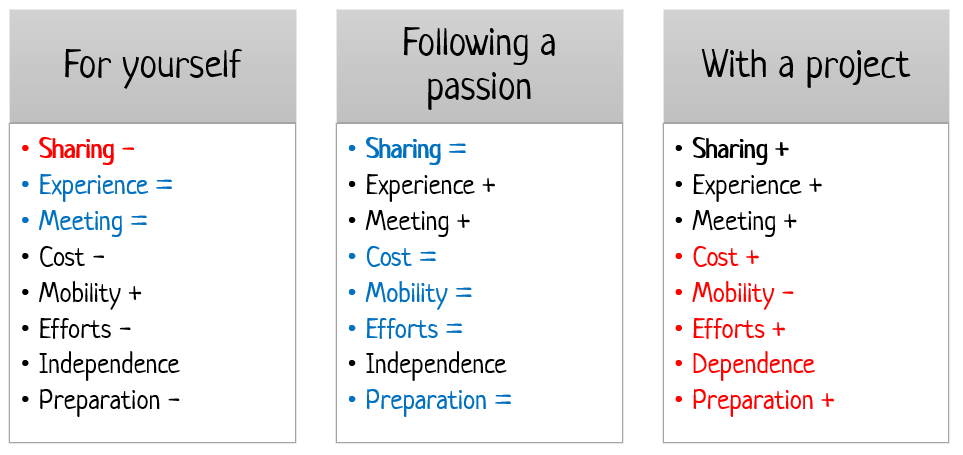
Advice:
There is a lot to learn about yourself, and it’s already a big deal. For a few months no need to come up with great dreams to educate and save the world. First you should get rid of many prejudices and understand how relative your own beliefs are.
But if you have a passion, for instance cooking, look for Chefs and rare meals, write the recipes of the grandmother who hosts you on a notebook. On internet you can find people sharing the same passion, or clubs and places where to meet them. Another example: you’re interested in Islam. Go and talk to imams in the mosquees, visit the holy monuments, travel in Turkey during Ramadan and observe the different sects such as Sunni and Shiite…. Your trip will be far richer and your meeting more interesting.
Finally, if your passions become projects, you will need more energy, more time and more money. And I recommend you to do a first trip to know your rhythm and your limits, but also to check if your project is not an illusion. For instance: teach local people how to respect the environment even if they don’t have trash cans or a collection system.
If you are specialist in a field, why not using it to share your experience? You would help people and learn a lot at the same time. You can even think about writing some articles to enlighten your colleagues.
3 - The transportation mode
Hitchhiking, but not only…
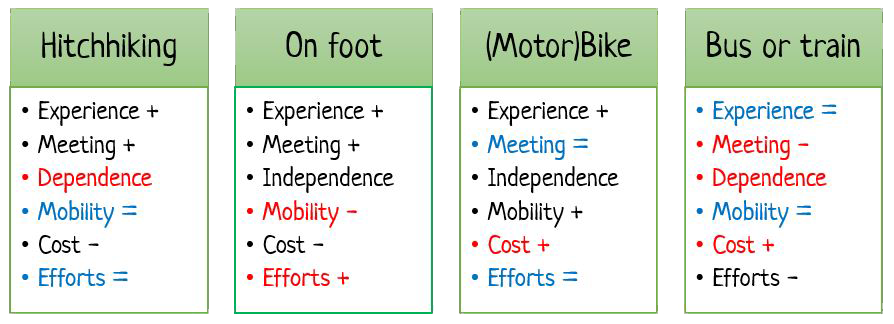
Advice:
During our trip in Asia we sometimes walked for a whole day. In some countries where hitchhiking is difficult, why not rent a bike or a scooter? It’s possible if you do a loop. You can then drop your bag in the home of some host and load the bike. Several means of transport are available!
Find here some of their drawbacks and advantages:
- Hitchhiking, you are dependent and you should assume : drivers are not at your disposal. You have to negotiate and talk, which can be exhausting, and your plans depend on the traffic. The counterpart is the low cost/mobility ratio, and all these people you meet. Moreover it’s probably one of the most comfortable way to hit the road, unless you’re stucked at the back of a pick-up. To learn more about hitchhiking, read this article.
- On foot you are independent and you take your time. It’s obvious. It’s total immersion without missing any step. But it demands a lot of precautions and time. Out of question to cross 100km of forest without water and food.
- By bike you can carry more stuff and you’re also independent from other people. The only drawback is the amount of efforts and technical issues on the road. You also have to check your bike all the time.
- As for the bus, it’s rarely comfy and you pay for it. Note: it’s nearby bus terminals that thiefs prowl around. The only advantage is when it comes to plan where and when you want to go. But is it necessary? You can use this means of transport to get over difficult situations, go faster or reach your objective on time.
4 - Rhythm and length
A difficult balance.
During my two trips, I stayed on average 1.4 nights in the same place. It’s really fast, a perpetual motion that prevents you to enjoy fully places and people.
Just to deploy a project you will certainly need minimum three or four days. You also need to plan the time you need to get the visa along the way, which may be up to ten days.
Here is a small tool to help you estimate the length of your trip depending on your transportation mode and your rhythm.
Km per day of transit (on foot: 30) (by bike: 100) (hitchhiking: 220) (by motorbike: 400) (by bus: 500). It’s an average which changes a lot depending on the mountainous areas, the infrastructures and as far as hitchhiking is concerned: the local culture.
5 - The right time
Find the perfect moment to travel.
Your availability
A gap year or some short holidays… It’s sometimes difficult to leave for a long time. Just know that a trip for immersion has some value: it’s not mass tourism and you can defend yourself in front of an employer. Even if it’s still considered as superfluous in some fields, you can explain it well on your CV and during your interviews: it will make a difference.
Despite everything, a few weeks are enough. This is not about doing all available activities, running around to take a selfie in every spot, but more about the intensity of your interactions with the place and its people.
If you go with friends, check their needs and their availability too. And you must not forget to meet altogether before you definitely leave.
The climate
If you plan to travel during the four seasons, there are some places you and your equipment cannot survive. However, no need to get -20°C equipment if you carry it 5 months to use it a few weeks : you can buy it or adapt when needed.
Check average weather on these maps:
Local events
On your way, you can probably miss some important events. On internet it’s difficult to know exactly what happens in which country every month. Here is a list for your information, dates may change, I hope it is useful:

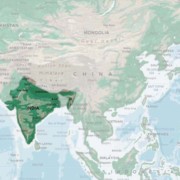
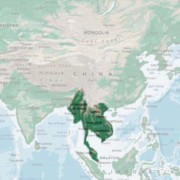
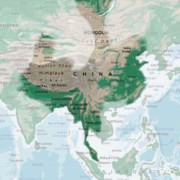

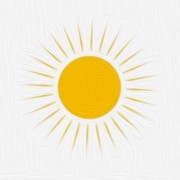








Comments